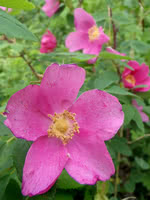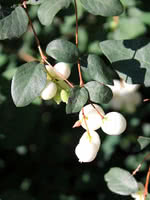Mon-Fri 9am - 5pm Mountain time
Hedge Rose vs Western Snowberry
Rosa rugosa x Rosa woodsii (Improved hybrid developed by PFRA)
Symphoricarpos occidentalis
NOT AVAILABLE THIS SEASON - MIGHT RETURN
Hedge Rose is a long-lived, fast-growing shrub. It bears similar flowers to the Alberta Wild Rose. Birds will love its deep red rose hips. Hedge Rose will thrive in a wide variety of soils and is a tall rose forming a useful hedge.
Excellent for shelterbelts, ecobuffers, and wildlife habitat plantings. Continuous flowering makes it attractive to pollinators. Many song and game birds utilize this tree for food and habitat.
In use since the early 1900s, this hybrid was originally developed at the PFRA's Indian Head Agroforestry Center.
Like the Common Snowberry, the Western Snowberry is a small shrub with pink flowers useful for feeding livestock and preventing erosion. Unlike the common species, however, the Western Snowberry is much more suited to wet conditions, capable of persevering through poor soil drainage and occasional flooding.
After the Snowberry's flowers have bloomed, it produces berries which often last on the plant through winter. These berries are toxic to humans, but livestock and local wildlife love them! Those hoping to attract wildlife to their property can plant Snowberry and expect to see animals foraging on it much later in the year than other plants.
Hedge Rose Quick Facts
Western Snowberry Quick Facts
Toxicity: berries are toxic to humans
In row spacing: 0.3 m (1.0 ft)

